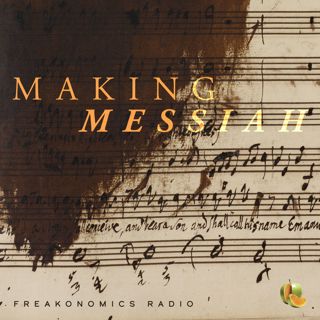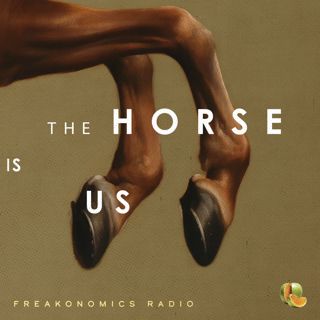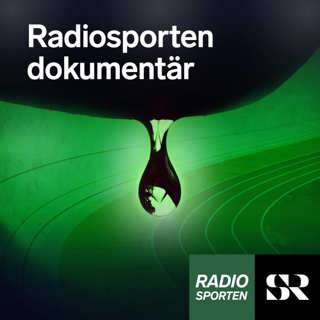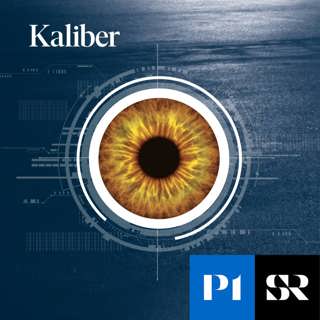
656. How Handel Got His Mojo Back
When he wrote Messiah (in 24 days), Handel was past his prime and nearly broke. One night in Dublin changed all that. (Part two of “Making Messiah.”) SOURCES:Charles King, political scientist at Georgetown University.Chris Scobie, curator of music, manuscripts, and archives at the British Library.Ellen Harris, musicologist and professor emeritus at MIT.Mark Risinger, teacher at St. Bernard's School.Philip Rushforth, organist and master of the choristers at the Chester Cathedral.Proinnsías Ó Duinn, conductor and music director of Our Lady's Choral Society. RESOURCES:Every Valley: The Desperate Lives and Troubled Times That Made Handel's Messiah, by Charles King (2024)."Arnaud du Sarrat and the international music trade in Halle and Leipzig c.1700," by Tomasz Górny (Early Music, 2023).George Frideric Handel: A Life with Friends, by Ellen Harris (2014).Handel (Composers Across Cultures), by Donald Burrows (2012)."Georg Händel (1622–97): The Barber-Surgeon Father of George Frideric Handel (1685–1759)," by Aileen Adams and B. Hofestädt (Journal Of Medical Biography, 2005).Handel's Messiah: A Celebration: A Richly Illustrated History of the Music and Its Eighteenth-Century Background, by Richard Luckett (1995).Handel's Messiah The Advent Calendar, podcast series. Hosted by Simplecast, an AdsWizz company. See pcm.adswizz.com for information about our collection and use of personal data for advertising.
12 Dec 57min

655. “The Greatest Piece of Participatory Art Ever Created”
Why does an 18th-century Christian oratorio lend such comfort to our own turbulent times? Stephen Dubner sets out for Dublin to tell the story of George Frideric Handel’s Messiah. (Part one of “Making Messiah.”) SOURCES:Charles King, political scientist at Georgetown University.Katrine Nyland Sørensen, Danish broadcaster, host of Handel's Messiah - The Advent Calendar.Mark Risinger, teacher at St. Bernard's School.Michael and Aileen Casey, Dublin conservationists.Proinnsías Ó Duinn, conductor and music director of Our Lady's Choral Society.Stuart Kinsella, tenor soloist and consort singer. RESOURCES:Every Valley: The Desperate Lives and Troubled Times That Made Handel's Messiah, by Charles King (2024)."Two Men Wrote ‘Messiah.’ You Know One of Them." by Charles King (New York Times, 2024)."On Fishamble Street, family lives among four centuries of relatives’ keepsakes," by Zuzia Whelan (Dublin Inquirer, 2018).Hallelujah: The Story of a Musical Genius & the City That Brought His Masterpiece, by Jonathan Bardon (2016).George Frideric Handel: A Life with Friends, by Ellen Harris (2014).Handel: The Man & His Music, by Jonathan Keates (2010)."Handel's Messiah," performed by The London Symphony Orchestra (2007).Handel's Messiah The Advent Calendar, podcast series. Hosted by Simplecast, an AdsWizz company. See pcm.adswizz.com for information about our collection and use of personal data for advertising.
5 Dec 56min

Dying Is Easy. Retail Is Hard. (Update)
Macy’s wants to recapture its glorious past. The author of the Wimpy Kid books wants to rebuild his dilapidated hometown. We just want to listen in. (Part two of a two-part series, first published in 2024) SOURCES:Mark Cohen, former professor and director of retail studies at Columbia Business School.Will Coss, vice president and executive producer of Macy’s Studios.Jeff Kinney, author, cartoonist, and owner of An Unlikely Story Bookstore and Café.Tony Spring, chairman and C.E.O. of Macy’s Inc. RESOURCES:"How Macy’s CEO Tony Spring Is Turning the Retailer Around," by Suzanne Kapner (The Wall Street Journal, 2025).“NBC Ready to Pay Triple to Gobble Up Thanksgiving Parade Broadcast Rights,” by Joe Flint (The Wall Street Journal, 2024).“How Macy’s Set Out to Conquer the Department Store Business — and Lost,” by Daphne Howland (Retail Dive, 2022).An Unlikely Story Bookstore and Café. EXTRAS:“Can the Macy’s Parade Save Macy’s?” series by Freakonomics Radio (2024). Hosted by Simplecast, an AdsWizz company. See pcm.adswizz.com for information about our collection and use of personal data for advertising.
28 Nov 1h 2min

Is Macy’s Thanksgiving Parade Its Most Valuable Asset? (Update)
The iconic department store calls the parade its “gift to the nation.” With 30 million TV viewers, it’s also a big moneymaker — at least we think it is: when it comes to parade economics, Macy’s is famously tight-lipped. In this 2024 episode, we try to loosen them up. (Part one of a two-part series.) SOURCES:John Cheney, carpenter at Macy’s Studios.Will Coss, vice president and executive producer of Macy’s Studios.Jeff Kinney, author, cartoonist, and owner of An Unlikely Story Bookstore and Café.Kevin Lynch, vice president of global helium at Messer.Jen Neal, executive vice president of live events and specials for NBCUniversal Entertainment.Tony Spring, chairman and C.E.O. of Macy’s Inc.Jessica Tisch, New York City police commissioner, former commissioner of the New York City Department of Sanitation.Dawn Tolson, executive director of Citywide Event Coordination and Management and the Street Activity Permit Office for the City of New York. RESOURCES:Macy’s: The Store. The Star. The Story., by Robert M. Grippo (2009).History of Macy’s of New York, 1853-1919: Chapters in the Evolution of the Department Store, by Ralph M. Hower (1943).Macy’s Thanksgiving Day Parade. EXTRAS:"Helium," by The Economics of Everyday Things (2024). Hosted by Simplecast, an AdsWizz company. See pcm.adswizz.com for information about our collection and use of personal data for advertising.
27 Nov 52min

654. Is the Public Ready for Private Equity?
A Trump executive order is giving retail investors more access to private markets. Is that a golden opportunity — or fool’s gold? SOURCES:Elisabeth de Fontenay, professor of law at Duke University.Steven Kaplan, professor of entrepreneurship and finance at the University of Chicago. RESOURCES:"Democratizing Access to Alternative Assets for 401(k) Investors," (The White House, 2025)."The (Heterogeneous) Economic Effects of Private Equity Buyouts," by Steven J. Davis, John Haltiwanger, Kyle Handley, Ben Lipsius, Josh Lerner, and Javier Miranda (Management Science, 2025)."Risk-Adjusted Returns of Private Equity Funds: A New Approach," by Arthur G. Korteweg and Stefan Nagel (The Review of Financial Studies, 2025)."The Effects of Management Buyouts on Operating Performance and Value," by Steven Kaplan (Journal of Financial Economics, 1989). EXTRAS:"The Biden Policy That Trump Hasn't Touched," by Freakonomics Radio (2025)."Should Companies Be Owned by Their Workers?" by Freakonomics Radio (2024)."Do You Know Who Owns Your Vet?" by Freakonomics Radio (2023)."Are Private Equity Firms Plundering the U.S. Economy?" by Freakonomics Radio (2023). Hosted by Simplecast, an AdsWizz company. See pcm.adswizz.com for information about our collection and use of personal data for advertising.
21 Nov 1h 3min

653. Does Horse Racing Have a Future?
Thoroughbred auction prices keep setting records. But tracks are closing, gambling revenues are falling, and the sport is increasingly reliant on subsidies. Is that the kind of long shot anybody wants? (Part three of a series, “The Horse Is Us.”) SOURCES:Anne Archer Hinkle, owner and director of Hinkle Farms.Cormac Breathnach, senior director of sales operations at Keeneland.Emily Plant, thoroughbred researcher and statistician, associate professor of marketing at the University of Montana.Mark Taylor, president of Taylor Made Farm.Marshall Gramm, horse player, professor of economics at Rhodes College in Memphis, Tennessee.Richard Migliore, head racing analyst for Fox Sports and New York Racing Association, retired jockey.Sean Feld, bloodstock agent.Scott Heider, managing principal of Chartwell Capital, thoroughbred investor.Thomas Lambert, economist at the University of Louisville. RESOURCES:Death of a Racehorse: An American Story, by Katie Bo Lillis (2025)."State of the States 2025: The AGA Analysis of the Commercial Casino Industry," (American Gaming Association, 2025)."An Empirical Analysis of Reputation Effects and Network Centrality in a Multi-Agency Context," by Emily Plant (University of Kentucky, 2010).Calculated Bets: Computers, Gambling, and Mathematical Modeling to Win (Outlooks), by Steven Skiena (2001).Bill Oppenheim and Emily Plant's Thoroughbred Market Reports.Horseracing Integrity and Safety Authority. Hosted by Simplecast, an AdsWizz company. See pcm.adswizz.com for information about our collection and use of personal data for advertising.
14 Nov 1h 1min

What Happens When You Turn 20
The world has changed a good bit since Freakonomics was first published. In this live anniversary episode, Stephen Dubner tells Geoff Bennett of PBS NewsHour everything he has learned since then. Happy birthday, Freakonomics. SOURCES:Geoff Bennett, co-anchor and co-managing editor of PBS News Hour. RESOURCES:Freakonomics Twentieth Anniversary Edition: A Rogue Economist Explores the Hidden Side of Everything, by Stephen Dubner and Steve Levitt (2025). Hosted by Simplecast, an AdsWizz company. See pcm.adswizz.com for information about our collection and use of personal data for advertising.
12 Nov 1h 2min

652. Inside the Horse-Industrial Complex
How does Kentucky keep itself atop the thoroughbred industry? Is a champion stallion really worth $200,000 per date? And how many hands can one jockey have? (Part two of a series, “The Horse Is Us.”) SOURCES:Emily Plant, thoroughbred researcher and statistician.Jill Stowe, professor of economics at the University of Kentucky.Mark Taylor, president of Taylor Made Farm.Oscar Gonzales, vice chair of the California Horse Racing Board.Richard Migliore, head racing analyst for Fox Sports and New York Racing Association, retired jockey. RESOURCES:"Horse racing industry braces for crackdown on illegal immigration," by Ximena Bustillo (NPR, 2025)."Conceptualizing the Kentucky Horse Industry as an Economic Cluster," by Lori Garkovich (Bluegrass Equine Digest, 2009). Hosted by Simplecast, an AdsWizz company. See pcm.adswizz.com for information about our collection and use of personal data for advertising.
7 Nov 1h





















